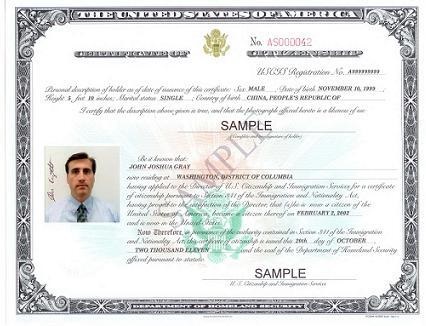
Certain individuals can file Form N-600, Application for Certificate of Citizenship, to obtain a Certificate of Citizenship. The certificate serves as evidence of a person’s U.S. citizenship. Document holders may use the certificate to apply for a U.S. passport or various other benefits.
There are different ways to become a U.S. citizen. USCIS only issues Certificates of Citizenship to those individuals who were born abroad but are U.S. citizens at birth through their parents, or who became citizens after birth but before the age of 18. This is different than the naturalization process.
A validly issued U.S. passport generally serves as evidence of your U.S. citizenship for most purposes during its period of validity. However, you may be required to submit your Certificate of Citizenship in order to obtain your initial passport or renew it. The certificate is also necessary when attempting to apply for certain other benefits, including, but not limited to:
Forms N-600 and N-600K are very similar but have unique use cases. Certain people use the N-600 application to obtain a certificate that evidences the date they became a U.S. citizen. If the applicant is a child who regularly resides outside the United States, the applicant (or parents acting on behalf of the applicant) must instead file Form N-600K, Application for Citizenship and Issuance of Certificate Under Section 322.
Generally, a person born outside of the United States may acquire citizenship at birth if that person has at least one parent who is a U.S. citizen and the U.S. citizen parent meets certain physical presence requirements in the U.S. prior to the person’s birth. Alternatively, certain foreign-born persons may derive citizenship after birth when a parent naturalizes as a U.S. citizen. Both may be able to claim citizenship and request a Certificate of Citizenship.
Under the Child Citizenship Act of 2000 (INA §320), a child automatically derives U.S. citizenship from a parent when all three of the following conditions are true at the same time:

A Citizenship Certificate is a U.S. identity document for a person who obtained U.S. citizenship through parents (derivation or acquisition).
The order of these events makes no difference. The child is a U.S. citizen by matter of law once all are true. The effective date of the Child Citizenship Act is February 27, 2001. Therefore, only persons under the age of 18 on or after that date (who satisfy the requirements of the law) derive U.S. citizenship.
Citizenship laws for acquisition have changed many times over the years. Eligibility is dependent on the date of the child's birth and the law in place at that time. The current law became effective November 14, 1986. For children born on or after November 14, 1986, the following is an overview of the law:
Children Born in Wedlock
Children Born out of Wedlock
Citizenship laws have changed extensively over the years. Therefore, the year of the applicant's birth can affect the determination of eligibility to file Form N-600, Application for Certificate of Citizenship. CitizenPath’s Citizenship Certificate Package can help most people determine eligibility. Our software will ask you a series of questions about you and your parents to decide if you may file Form N-600.